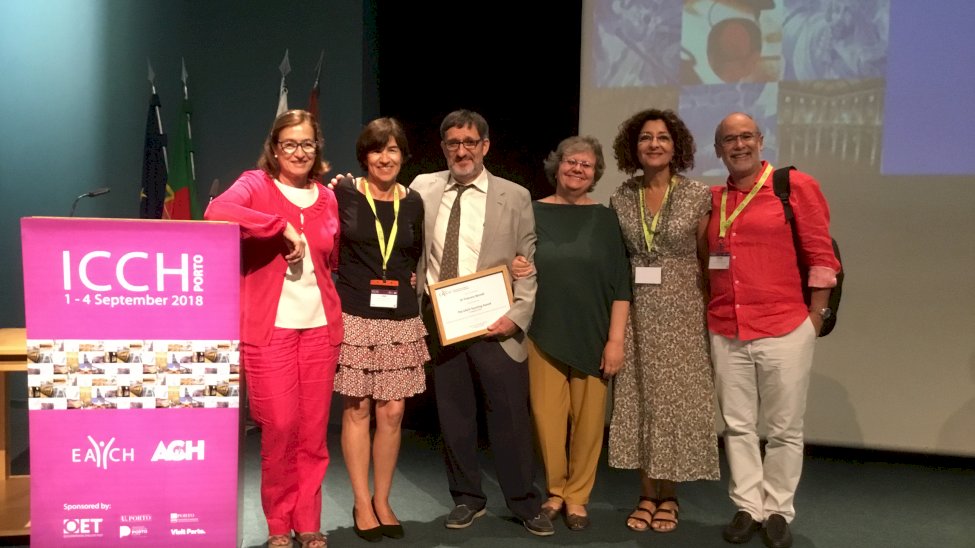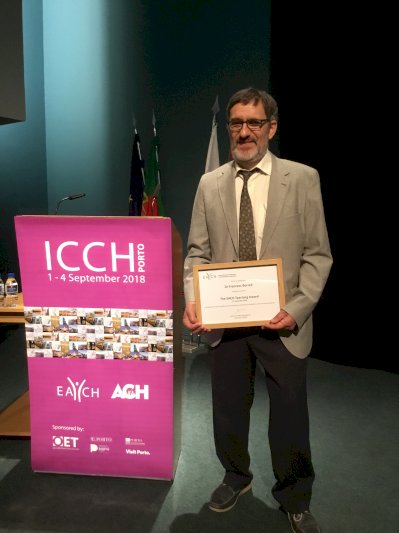"I have been practicing for 40 years and the moment I felt most useful was when I managed to enter into the patient's life"
Francesc Borell, winner of the EACH International Award
Good morning Francesc and thank you very much for giving us the chance to do this interview.
First of all, congratulations for the prestigious EACH award from the International Association for Communication in Healthcare that you have just received.
How do you feel?
Good morning, I’m feeling very happy, especially since it is a recognition that I wasn’t expecting at all. This success is due in large part to the testimonies and letters of support from professionals throughout Spain. As I said when I received the award, this award is a recognition for the entire Spanish Communication and Health Group.
You have long been a reference for giving motivational interviews and in the field of communication for family medicine practice over all. Could you explain, broadly speaking, what the key elements are for a good clinical interview?
The clinical interview has three functions: establishing a health care relationship, understanding the problem or problems of the patient and establishing a shared behaviour to improve their situation. Sometimes we think that the interview basically consists of a series of questions. The truth is that very often the most important thing is to listen, to understand the current context of the patient and their family, to prioritize their health needs and to adapt to their values.
Certainly, family and community medicine has long claimed its role and its particularity in the field of the doctor-patient relationship. Why is this factor so important?
It is a cliché to say that it is the soul of our specialty. I have been practicing for 40 years and the highlights of my daily practice are when you manage to understand and enter the patient's life. From this moment you are part of his biography, whether you want it or not, you are a reference for many decisions that go beyond medicine but have to do with their quality of life.
Is this very close patient-doctor relationship something exclusive to the family doctor and family medicine?
Many specialists, and especially nursing professionals, establish very significant relationships with their patients. The specific thing about the family doctor is that if they does their job well, they will establish a meaningful relationship with most of their patients. Here, is where the merit lies, as well as the value of the family medicine: there are no good or bad patients, interesting or boring, they all must deserve our attention and effort. I say effort because a key question that should be permanently in your head as a family doctor is ... "What contribution can I make to this patient?" In order to answer this, we must enter the patient’s world.
And we must enter this world with a training that goes beyond technical aspects of our profession, beyond pathology, semiology and even beyond communication skills. We must internalise the biographical challenges that we face, the challenges of getting sick, the aftermath of chemotherapy, remaining unemployed, etc., as well as the opportunities we find in every stage. Empathising with suffering is fine, but it is even better when the doctor knows how to open up new biographical horizons.
What are the most complicated elements in a clinical interview?
There are many barriers to jump in order to achieve a good interview. The first challenge every doctor has to face is the lack of time. The COMCORD study conducted with residents of family medicine, found that throughout their three years of residence, residents often decreased the quality of the relationship at the expense of greater efficiency and use of time. This type of study has been carried out in several countries with similar results.
But there are also other barriers that are more difficult to detect, such as prejudice and diagnostic anchoring. Prejudices make us think, in the first moments of an interview, things such as ... "this patient is a complainer", "what he needs is attention", "what an enjoying person", etc. All these judgments interfere severely in the listening and they can be the cause of diagnostic errors. On the other hand, once a diagnosis is established we must be flexible and prepared to rectify it at any time.
What are the most difficult elements that doctors have to manage at a socio-cultural level?
A study by Trevino et al (2016) revealed that only 21% of patients with terminal cancer believed the prognostic information provided by their oncologist. Often opinions from their family environment, friends, healers, etc., could have a more decisive role. That gives us a glimpse of the socio-cultural complexity of our work. In principle, a family doctor has a certain prestige in a neighbourhood or town. People say things such as: "he will give you good advice" etc. However, sometimes negative messages are also communicated: "do not listen", "it seems that doing an analysis is like doing you a favour", etc. We are not always aware of this complexity.
Nowadays, do you think that motivational interviews receive enough importance in the academic world?
Here we should highlight the training of pre-graduates. Students must have a broad knowledge of clinical interviews, and acquire fundamental skills. They have to work with emotional aspects to know if they are in the "reactive" or "proactive" mode. They mechanise the semi-structured interview and acquire a general idea of interview modalities, including the motivational interview. In the case of family medicine, the motivational interview and the biopsychosocial integration interview are of great interest.
Could you tell us a little about your relationship with the European EACH network?
The EACH is the European Association of Communication and Health. The Group from Spain is integrated. There are three international working groups including one devoted to teaching, another one to research and a third o public policies. Our group maintains fraternal ties with people from the United States, Canada, United Kingdom, Holland, Belgium etc. These contacts enrich our work enormously.
What does this international recognition consist of?
The EACH Teaching Award is a prize awarded for the second time to the whole career of a European professional. The jury is composed of eight people from different countries, who examine the candidates' CVs and the testimonies of other professionals who know them personally.
At the international level, are the bases of communication in health extended to all of the health systems in our environment?
It depends to a large extent on whether there is a national health system, whether in that system doctors work in isolation or in health care centers, and the role played by universities and other professionals. Within EACH there is a large academic participation that comes from Central Europe. In countries such as Spain and the United Kingdom, doctors and family doctors have an high participation, in the same way as pediatricians, psychologists and nursing professionals in the case of Spain.
This participation of family doctors ensures that the theoretical models do not remain as purely theoretical models. Overall, what is important is that these models become the reality of each country. Hence the importance of care professionals having a voice in these international organisations.
After a long career and in which you have already deepened a lot in the field of communication and health, what would you say you have left to learn?
We are always blind to what is most needed, and this is to the patients, especially the difficult patients, who show us our shortcomings. We should be very grateful to them for illuminating these corners where, out of pride or ignorance, we do not dare or do not want to move forward.
Would you like to add something else?
Trying to be a good family doctor occupies so much space that we can forget other dimensions of our life. The profession cannot annul us as parents, children, etc., and neither as people. It is necessary to put the family on the agenda, and cultivate good humor, always with an attitude that seeks to solve problems rather than complicate them. In the end, we are all in the same boat, and it is up to each one of us to make the crossing more enjoyable.
The EACH Teaching Award The EACH Award is an innovative international award that recognises communication and health teachers and is presented every two years at the international conferences of CyS ICCH (International Conference on Communication in Healthcare). The award recognizes those health communicators and teachers from all over the world who have made a significant contribution to health education in the fields of communication and the doctor-patient relationship.


